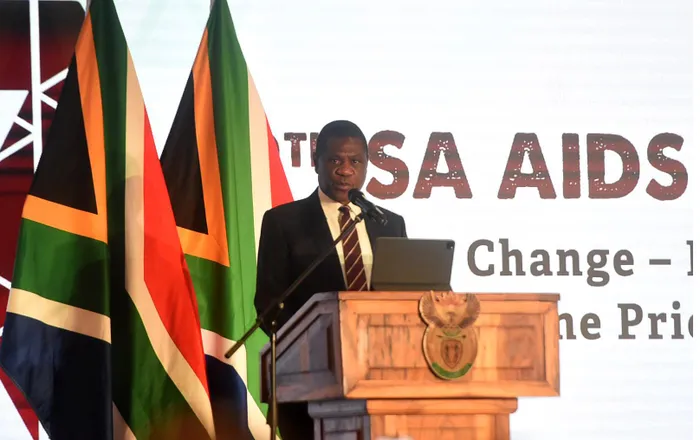
Deputy president Paul Mashatile, in his capacity as Chairperson of the South African National AIDS Council (SANAC), opened the 12th SA AIDS Conference at Emperor’s Palace.
Image: Itumeleng English/ Independent Newspapers
World Health Organization (WHO) Director-General Dr Tedros Ghebreyesus has commended South Africa for its efforts in finding new ways to fund HIV/Aids programmes following the recent USAID funding cuts.
Dr Tedros Adhanom Ghebreyesus delivered his message of support to local and international guests gathered at the 12th South African AIDS Conference, currently taking place at the Emperors Palace in Ekurhuleni.
"I congratulate South Africa in the face of major disruptions and dramatic cuts in aid. I commend the government for moving quickly to analyse the impact of these cuts. South Africa has tried to develop and find contingency plans for each province. These cuts also bring opportunities. I commend South Africa for its commitment to strengthening domestic funding for HIV/Aids and tuberculosis (TB). We welcome the new HIV/Aids Sustainability Roadmap," he said.
Deputy President Paul Mashatile, as chairperson of the South African National AIDS Council (SANAC), said that the recent President’s Emergency Plan for AIDS Relief (PEPFAR) funding withdrawal will not hurt the country's HIV/Aids programmes.
"As the South African government, we acknowledge the impact of US funding cuts. Even so, our government is diligently working to preserve our achievements in the fight against HIV/Aids. While these accomplishments may momentarily jeopardise our achievements, we will prevail," he said.
Mashatile, delivering his opening address on the first day of the 12th AIDS Conference, called for equitable access to healthcare, ensuring that no one is left behind. He said to achieve this, efforts should focus on education, awareness, and anti-stigma initiatives as ways to break down barriers and foster a culture of understanding and support.
"Additionally, it is essential to concentrate on harmonising our objectives with existing sustainable development goals aimed at healthcare equity. This means swift action and prioritising key populations, exhibiting high-risk behaviour through community engagement and support," he said.
Under the theme "Unite for Change – Empower Communities and Redefine", the five-day gathering has brought together leaders, researchers, partners, and other key stakeholders to deliberate and strengthen the management and fight against HIV.
Mashatile indicated that SANAC is currently consolidating reports and data from various sources and implementers to establish how the country has performed in the implementation of the National Strategic Plan (NSP).
Through its four Goals, the NSP emphasises the need to break down barriers and maximise equitable and equal access to services through resilient and integrated health systems to guarantee the health and social protection of all South Africans.
"As we have often said as SANAC, this NSP has been a game changer in many ways; it was developed using lessons from the Covid-19 pandemic and is, therefore, pandemic-ready. It also goes further into the social and structural causes of the three epidemics (HIV, tuberculosis, and STIs).
"The Plan also includes an enlarged scope for STI care, including viral hepatitis, which has been linked to HIV transmission. This is also the last NSP to usher us into the year 2030. We are, therefore, hoping for a good story to tell once the Mid-Term Review report is published, and it will give us an indication of what to improve as we forge ahead towards Agenda 2030," Mashatile stated.
Cape Times